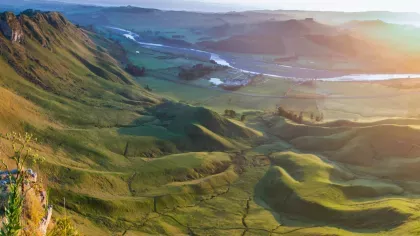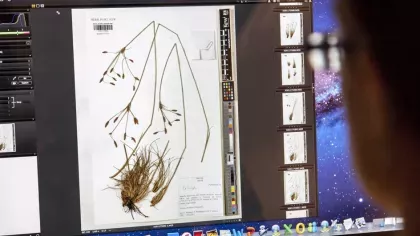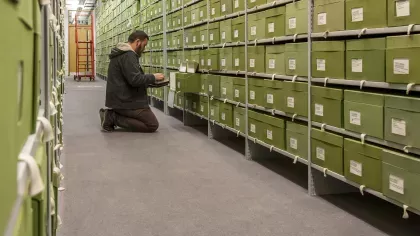19 June 2023
Bringing together a billion specimens to combat global issues
Global institutions join forces to unite over a billion specimens, addressing global challenges like food security, biodiversity loss, and pandemic preparedness.

Global issues often require global solutions. In a world’s first, institutions from across the globe commit to uniting over a billion specimens to help find solutions to the many issues facing the planet, from food security and biodiversity loss to pandemic preparedness.
Beyond the walls of the iconic public galleries and gardens, the world’s natural history institutions serve as the guardians of an unprecedented archive of the history of our planet and solar system.
These may seem far withdrawn from having any real-world impact, however these scientific collections provide a unique window into the planet’s past, and they are increasingly being used to make actionable forecasts to chart our future.

Historic hurdles
However, currently, collections from institutions around the world remain fragmented in that they’re not centralised in any one database.
They contain valuable information about the biodiversity of our planet, including the distribution and characteristics of plant species - yet it’s not easily accessible or searchable in a standardised way, which makes it difficult for scientists to make use of it effectively.
Institutions unite to find a solution
The new initiative sees us join institutions from across the world – including the Natural History Museum (NHM) and the Royal Botanic Gardens, Edinburgh – in a commitment to connect critical scientific data held within collections.
It has so far mapped the total collections from 73 of the world's largest natural history museums in 28 countries, which is the first step of an ambitious effort to inventory global holdings that can help scientists and decision-makers find solutions to urgent, wide-ranging issues such as climate change, food security, human health and wildlife conservation.

To better understand this immense, untapped resource, leading scientists from some of these institutions, including Sarah Philips and Alan Paton here at Kew, created an innovative but simple framework to rapidly evaluate the size and composition of natural history museum collections globally. The findings are now published in Science magazine in the paper, 'A Global Approach for Natural History Museum Collections.'
In response to this paper, our director Richard Deverell said:
“This research, based on unprecedented global collaboration, sets out in stark terms the vital importance of natural history collections. These collections embody knowledge that will help us solve the existential crises facing biodiversity and our climate and it is therefore essential that they are digitised, accessible and protected as an invaluable resource for humanity.”
By digitising and integrating these collections into a single database, the project aims to make this information more readily available and useful for scientific research and conservation efforts. But to do this, specimens first need to be brought online.

Bringing millions of specimens online: Digitising for accessibility
We recently celebrated reaching the one-year mark on our ambitious four-year Digitisation Project that aims to make our entire collection of 8 million plant and fungal specimens freely available for anyone to access anywhere around the world.
The project involves digitising our Herbarium and Fungarium collections, which is essentially a library of dried and pressed plant and fungal specimens. By digitising these specimens and making the data available online, Kew is making it easier for scientists and researchers to understand and protect our planet.

You can now immortalise a piece of botanic history. Donate to digitise a plant today and help us unlock nature's secrets.
For example, let's say a botanist in Japan wants to study a particular species of plant that's only found in South America. Instead of having to travel to South America to see the plant in person or visiting Kew in London to see the dried specimen, the botanist can access a digital image of the plant from our Data Portal and use that as a reference.
This not only saves time and money but also reduces the need for researchers to physically handle and potentially damage the original specimen.
By sharing this data and collaborating with other institutions as part of the new initiative, we’re helping to advance our knowledge of plants and their role in the world around us. Further still, many of these collections underpin crucial research into global issues such as climate change and the biodiversity crisis which makes this work all the more urgent.



